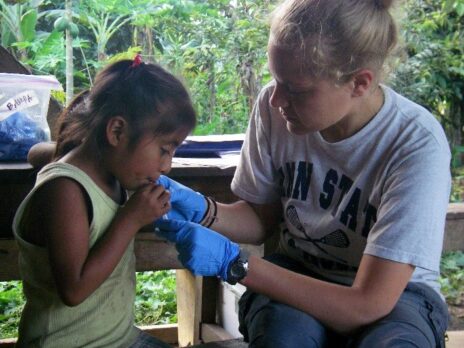Contact the Department of Anthropology

Connect with us
FacebookAnthropology labs
Learn about the lab facilities that our faculty and students conduct their research in.NAU research
Northern Arizona University is a research-intensive university. See what other research is being conducted across campus.Sociocultural and Biocultural Anthropology
Sociocultural Anthropology at NAU focuses on the range of human cultural diversity and anthropological perspectives, ethics, and theory. It covers the intersections of language and discourse, kinship, gender and sexuality, race and ethnicity, religion, economics, social inequality, politics, environment, culture change, and globalization. The skills developed include: critical reading and writing, effective communication skills, cross-cultural and holistic perspectives, analysis of culture, and ethical awareness. NAU faculty in sociocultural anthropology are engaged in a wide range of research, including the projects featured below.
Projects and research
US Midlife Mortality Accordion Closed
Dr. Michelle Parsons is building on her work on the Russian mortality crisis, published in her book “Dying Unneeded: The Cultural Context of the Russian Mortality Crisis” published by Vanderbilt Press in 2014. Her current research, is focused on the US midlife mortality crisis in a county in Northern Arizona. This research is funded by the National Science Foundation (1658528).
Experiences of COVID-19 Accordion Closed
Dr. Hardy and Dr. Mundell started a research project in March 2020, as the COVID-19 pandemic and resulting economic and social shutdowns were ramping up. The research involves ethnographic interviews with Americans from a range of demographics. Hardy and Mundell wanted to characterize and understand power, policy, health, inequality, illness and justice from a holistic perspective. This kind of understanding, in Hardy’s words, can only be achieved through collaboration with communities and across disciplines.
Political Anthropology of Social Uprising in Sarajevo, Bosnia-Herzegovina Accordion Closed
Dr. Nataša Garić-Humphrey‘s research is focused on intergenerational dynamics and social movements in Sarajevo, Bosnia-Herzegovina. Her most recent work, “Negotiating “True” Politics: Intergenerational Dynamics During Social Uprising in Sarajevo, Bosnia-Herzegovina” is featured in Political and Legal Anthropology Review.
Ailing Miskitu lobster divers in Nicaragua Accordion Closed
Dr. Clinton Humphrey’s research is focus on ailing Miskitu lobster divers in Nicaragua. As the lobster industry has slowly collapsed along the Atlantic Coast of Nicaragua, so have the bodies and livelihoods of thousands of men suffering from chronic decompression sickness. The overarching aim of Dr. Humphrey’s research has been to track the ways in which illnesses come into being and persist for these commercial divers, as they struggle to navigate an exploitive transnational seafood industry in addition to the dangerous undersea ecologies where they must carry out their work. This context of suffering has inspired ongoing studies of how globalized political-economic processes converge with the generative embodied practices—including communicative practices—shaping perceptions of illness, the environment, and the precarity of one’s labors.
An important aspect of Dr. Humphrey’s research is the extensive use of videography to record social interaction and communication. In Nicaragua, the use of video has been crucial when analyzing the productive power of public discourses to racialize disease and covertly blame the sufferers. Videographic methods have also fueled his deep interest in exploring the various ways in which anthropologists use visual media to capture “raw data” and/or produce ethnographic representations. He has produced and edited several anthropological films, most of them in collaboration with students, colleagues, and Native American community activists in Northern Arizona.


